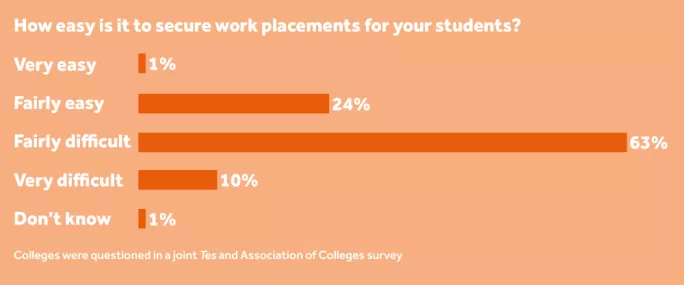Finding enough work placements is hard, colleges warn

Since the new T-level qualifications were announced earlier this year, the need for colleges to secure work placements for their students has arguably never been greater.
But a survey by the Association of Colleges, (AoC) in partnership with Tes, reveals that most colleges find it difficult to link their students to the world of work. The survey shows that almost three-quarters of colleges find it “fairly difficult” or “very difficult” to secure work placements for their students, while just 1 per cent say getting work placements is “very easy”.
The proposed T levels would require every student on each of the programme’s 15 technical routes to undertake a “high-quality industry work placement”. For colleges, this means finding a workplace to take on each of their students.
“The main issue is finding appropriate placements and in the numbers required,” says Catherine Sezen, senior policy manager at the AoC. “As we move towards work placements of up to three months, this will be exacerbated by the fact that it is a condition of certification. Timetabling will also be more challenging for longer placements.”
Sezen says that another reason why some colleges are finding it difficult is because institutions in areas dominated by small- and medium-sized enterprises may not have the same opportunities as colleges in areas with larger employers. Smaller businesses are sometimes reluctant to take on young people for work experience, or even apprentices, because of the extra workload this creates for the small number of staff.
Small- and medium-sized enterprises, defined as businesses with 250 or fewer employees, make up a large proportion of the UK economy. They are particularly common in some industries, such as hairdressing and beauty. Mike Cherry, national chairman of the Federation of Small Businesses, says small firms do struggle to identify where a young person fits into the business, or how best to structure a work-experience placement. But the majority of small businesses are offering placements to young people, with 70 per cent keen to do so.
“While this research suggests that colleges are struggling to secure work placements, we think colleges could do a little more to help themselves,” Cherry says. “They should look at providing small businesses with good models and templates on how to structure high-quality work experience placements and how best to support a young person at work.”

Seamus Nevin, head of employment and skills policy at the Institute of Directors, also thinks the onus is on colleges to help employers create appropriate placements for their students. Nevin says that half of the institute’s members already engage directly with further education providers to provide work placements, but that there is a practical difficulty in “linking the worlds of work and education”. This, he says, is due to a tendency for colleges to prioritise their students’ studies and extracurricular commitments over their undertaking of work placements.
“Ten per cent of IoD members report reaching out to offer work placements for students but having the offer declined by a college,” he says. “Clearly employers and FE colleges need to do a better job of working together to accommodate each other’s needs.”
David Jones, chief executive of Coleg Cambria, in north-east Wales, says his college has had success with helping students to gain work placements by using pre-existing and “well-established” links with employers, and by planning where to fit the placement into a student’s busy college life. He also believes that the introduction of the apprenticeship levy has helped colleges and employers to work more closely together.
“The growth in apprenticeships is probably having an impact on the availability of work experience, as many more employers have apprentices in their workforce, learning as they’re earning in work,” he says.
You need a Tes subscription to read this article
Subscribe now to read this article and get other subscriber-only content:
- Unlimited access to all Tes magazine content
- Exclusive subscriber-only stories
- Award-winning email newsletters
Already a subscriber? Log in
You need a subscription to read this article
Subscribe now to read this article and get other subscriber-only content, including:
- Unlimited access to all Tes magazine content
- Exclusive subscriber-only stories
- Award-winning email newsletters